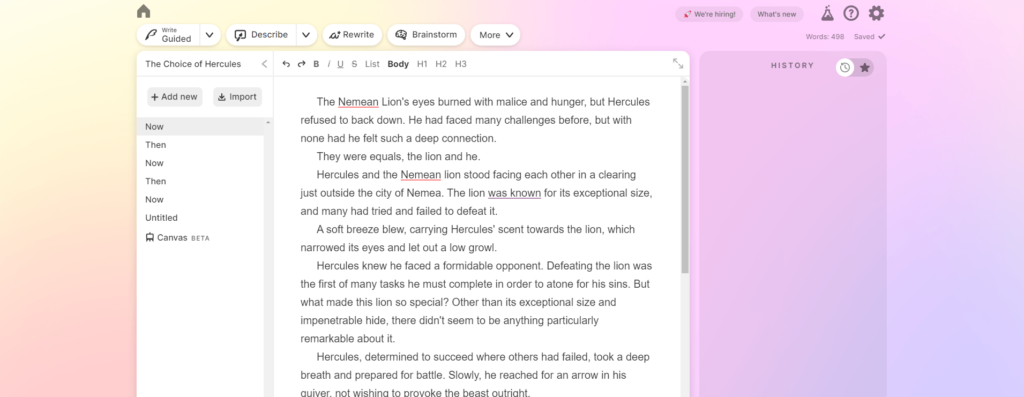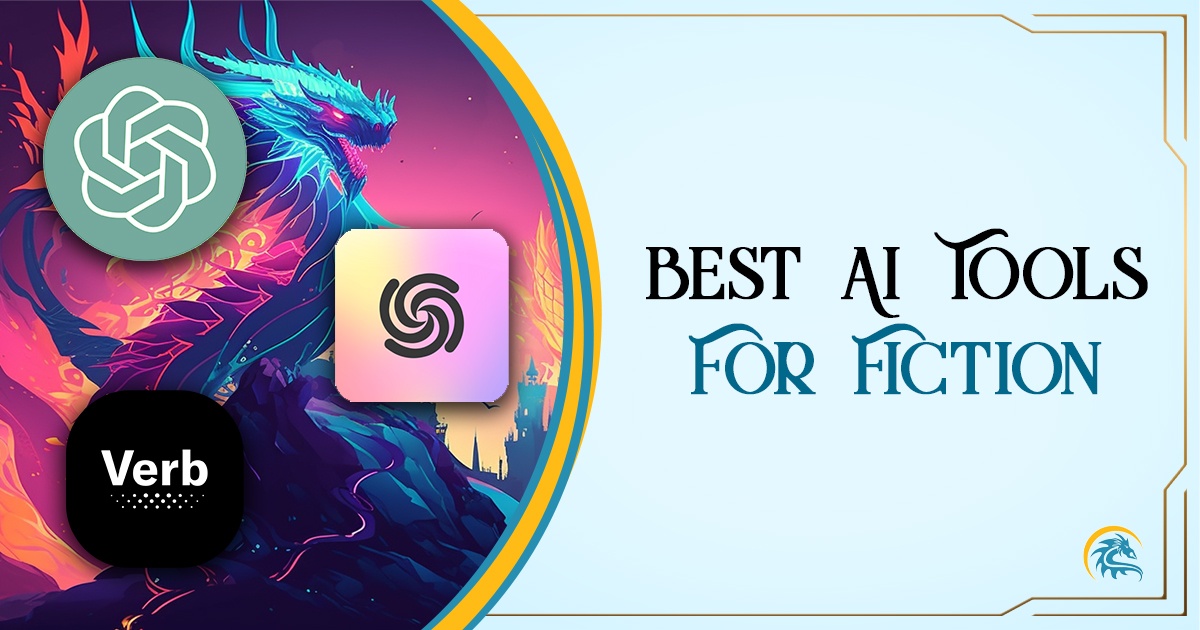When you Google the “Best AI Tool for Fiction” a lot of results will come up of people who clearly don’t know what they’re talking about. You end up with a long list of generic AI tools, and it’s clear that the author clearly never wrote a fiction book in their life.
Well I have.
And I’m here today to tell you which AI tool is the best for writing fiction. Unlike nonfiction AI writing, there are only a few good options, so this will not be a lengthy list.
Each has their own pros and cons, which I’ll give here. I’ll also present my favorite tool for writing fiction.
Spoiler alert: it’s ChatGPT. Why? Well I have a number of reasons. And ChatGPT is certainly not the best AI writing tool for everyone.
But I’ll get into that below.
The 4 Best AI Writing Tools for Fiction
The following are, I believe, the best tools for fiction. I’ve arranged them in no particular order.
- Sudowrite
- Verb
- OpenAI Playground
- ChatGPT
Let’s go through these one by one.
1. Sudowrite

Cost: $19/month for 30,000 AI words $29/month for 90,000 words, $129/month for 300,000 AI words. I recommend the $29/month tier.
Pros:
- Lots of features
- Built with fiction writers in mind
- Great revision and first draft tools
- Great for brainstorming
- No content restrictions
Cons:
- An overwhelming amount of features
- Some features have poor design
- The most expensive on this list (though admittedly less than many other AI tools on the market)
In the realm of AI and writing tools, Sudowrite has captured the attention of many writers, offering a multitude of features aimed at enhancing their storytelling process. As one of the best AI tools for fiction writers, Sudowrite provides numerous advantages, despite its imperfections.
Sudowrite’s extensive features can be categorized into writing tools, revision tools, brainstorming tools, and others. Writing tools like First Draft, Guided and Auto Write, Tone Shift, and Expand help in the initial stages of crafting a manuscript. Revision tools such as Rewrite and Describe aid in polishing the manuscript.
Brainstorming tools cover a wide array of categories, including dialogue, characters, world-building, plot points, and more. These tools help to generate ideas and stimulate creativity. Other tools like Visualize, Shrink Ray, Twist, Poem, and Themes offer unique benefits, from generating images to creating loglines, blurbs, synopses, and outlines.
However, Sudowrite has some downsides, including an overwhelming interface and the need for better structure in the Canvas feature. Despite these drawbacks, Sudowrite remains the top choice for fiction authors, offering a comprehensive and user-friendly experience in comparison to other AI tools like ChatGPT.
Additionally, authors who write erotic romance, or gratuitous violence and gore may find Sudowrite to be their best option, as it has no content-based restrictions like ChatGPT has.
The Bottom Line: For tools that are specifically built for fiction, Sudowrite may be the best one (but it’s still not the one I use).
2. Verb.ai

Cost: Free while in open beta
Pros:
- A minimalist design
- A more linear approach to writing
- It knows who your characters are
- Manuscript analysis
Cons:
- Fewer features
- No way to produce a whole scene at once
Verb.ai is an AI writing tool that offers a minimalist design and a more linear approach to writing, making it an excellent choice for discovery writers. Unlike other AI tools such as Sudowrite and ChatGPT, Verb.ai focuses on generating smaller chunks of text at a time, around 100-200 words, based on what you feed it. I personally found this helped me enter a flow state better, and maintain my creativity, but this focus on producing smaller sections of text rather than generating an entire scene at once (as other tools can do) may be a plus for some but a downside for others.
One of the key features of Verb.ai is the ability to create a character database. This feature ensures that the AI tool understands the characters’ attributes, leading to more accurate and consistent interactions in dialogue and actions within the text.
Furthermore, Verb.ai can analyze a manuscript and compare it to other best-selling books, providing valuable insights for improvement.
As a relatively new tool, Verb.ai has fewer features compared to its counterparts. And if you don’t like the linear form of writing, it might not be fore you. But it’s currently free as of this writing, since it is in open beta, so there’s nothing stopping you from trying it out.
The Bottom Line: This is an equally useable AI tool to Sudowrite, and which one you use will depend on your writing style preferences.
3. ChatGPT Plus

Cost: $20/month
Pros:
- You essentially get unlimited words
- Infinite customizability
- Great for brainstorming and outlining
Cons:
- Requires some skill in learning how to prompt well
- You can’t edit the responses
ChatGPT Plus is my favorite way to write fiction, and I’ll tell you why.
The main reason is that of the cost. Sudowrite has a limit to the number of words it generates, and OpenAI’s Playground is a pay-as-you-go model. I find that when I have those limitations, I feel creatively stunted. I won’t try new things, new prompts, ask it to reiterate, etc., because I don’t want to overdo my word count and either run out of credits or drive up the cost.
With ChatGPT, I don’t have to worry about that.
ChatGPT is also extremely versatile. You can do almost anything you can imagine, as long as you feed it the right prompt.
And that’s the big downside: you have to learn prompt engineering. There’s simply no other way around it. But if you get good at it, you can create some amazing results that you would not have been able to do with Sudowrite or Verb. Those programs will hold your hand a lot more, which isn’t a bad thing for some people, but it will put a limit on what you can do.
Speaking of limitations, ChatGPT does have some content restrictions, which means if you write erotica or excessive violence, you might want to choose Sudowrite or Verb instead.
The Bottom Line: ChatGPT is still my favorite tool for writing fiction, and I honestly believe that most authors will not need anything extra.
3. OpenAI Playground

Cost: Varies based on the model. Pay as you go.
Pros:
- Everything ChatGPT provides
- Extreme flexibility
- Inexpensive
- Can edit past responses
Cons:
- Pay as you go
OpenAI Playground might be the only one that truly challenges ChatGPT Plus in my mind. That’s mostly because they are basically the same thing.
And the Playground actually has one advantage over ChatGPT: you can edit past responses. So if it writes something, then I go through and edit that response, it will remember my edited version and not the response it gave (although it can only remember so much before you have to start deleting past responses).
The big downside here is that the Playground is pay as you go. It’s relatively inexpensive, especially for older models, but once again I find this limits what I want to do with it. With ChatGPT I can just keep iterating and trying new things, which I don’t want to do with Playground.
Additionally, you have to pay for any words you want it to remember. So even though you can edit the past responses, you’ll be paying for any words you leave in the window, as it requires processing power to analyze those words.
If you don’t use AI very often, this isn’t a huge issue. It will still be very affordable. But if you use AI a lot in your writing, I find it more economical (and mentally freeing) to use ChatGPT.
The Bottom Line: While it is a close contender, and may very well be the preferred option in the future, its pricing makes me prefer ChatGPT.
Verdict: Which Should You Use?
For most authors, ChatGPT is what I would use to write fiction.
There is one exception, and that is if you frequently need to write things like sex scenes, gratuitous violence and gore, or other scenes that will likely be flagged by ChatGPT. If that is the case, I would use Sudowrite.
But with that said, ChatGPT is simply the better option for three reasons:
- It’s more versatile, you can ask it for anything you need
- It has a fixed cost for essentially unlimited words
- It’s at the forefront of AI innovation right now, meaning it is often the first to get any major improvements
This may change in the future, and I will be happy to update this post if I ever find that another tool has surpassed ChatGPT for writing fiction, but for now, ChatGPT is my choice.

